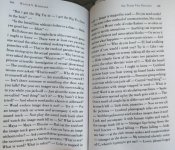Benny Bunter
Well-known member
It's interesting Pound's conception of an image isn't restricted to something to be looked at. It's more like a frozen moment captured in any medium and which comes to life again when encountered.
Yeah, it's arguable these ideas come from painting and calligraphy first, which Pound and Burroughs were both taking cues from. Burroughs took the cut-up/collage techniques from Gysin into writing, recognising that they had already been used for decades in painting. Pound was into Chinese characters and calligraphy and used them in the Cantos.
And of course the Ticket ends with Gysin's calligraphy.

